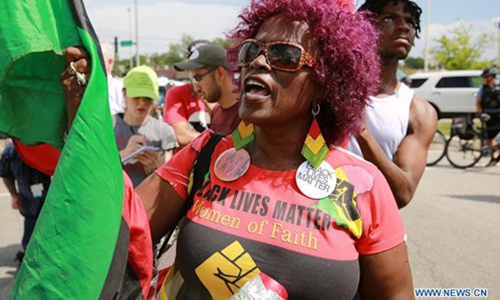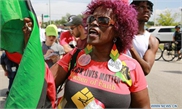
A protester calls for more attention to gun violence in African American community during a protest in Chicago, the United States, on September 3, 2018. Photo: Xinhua
As the establishment in D.C. continues to blame its inept response to COVID-19 on China, the World Health Organization, domestic voices calling for strengthened relief efforts, or quite frankly anyone with an alternate opinion, the pandemic is revealing an ever-present trait of US society - institutional racism.African Americans in Louisiana, Michigan, Mississippi, and Illinois are the clear minority. However, in each of these states, proportion of African Americans who have died from COVID-19 is higher than their percentage of the population
In many ways, another Hurricane Katrina has gripped Louisiana, where African Americans have made up more than 70 percent of COVID-19 deaths, said Louisiana Governor John Bel Edwards. Detroit is 80 percent black, and the city has the highest concentration of deaths in Michigan, accounting for 40 percent of all deaths.
The US is the only major country in the world that doesn't provide healthcare to its citizens as a human right. A "system" (some analysts prefer the term "racket") allowing insurance and pharmaceutical companies to profit from illness exacerbates health issues in the black community.
In 1981, President Ronald Reagan abolished medical aid for more than a fifth of the population. His policies increased hospitals bills and allowed the federal government to fund the closure of hospitals it deemed unnecessary. State-level governments were allowed to cut funding. This all severely affected African Americans who during the Reagan and Bush administrations had half of the household wealth of whites and were more than twice as likely to be unemployed, and thus lacked job-related health insurance.
When COVID-19 hit the US, these disparities had worsened throughout succeeding administrations, including the Obama administration which did not advocate a public option. The Trump administration has defunded the most progressive aspects of the Obama-era Affordable Care Act.
African Americans are highly concentrated in urban areas and often work in what are deemed essential industries, putting them at a higher risk of infection. About 25.6 percent of blacks and 24.3 percent of Latinos live in neighborhoods with few or no primary care physicians.
Just 166 kilometers from Florida's coast it's a different story in Cuba where the country's neighborhood doctor program guarantees free cradle-to-grave access to primary care to all. Yet US mainstream commentators shy away from pointing out this discrepancy and rarely question the almighty hand of the supposedly free market.
Moreover, the quality of care US minorities have access to is often inadequate. Healthcare providers located in African American and Latino neighborhoods tend to provide lower-quality care, according to the Century Foundation. As Martin Luther King Jr. said in 1966, "Of all the forms of inequality and injustice, healthcare is the most shocking and inhumane."
Another issue is pre-existing conditions. COVID-19 is said to be deadlier among those who are obese or have high blood pressure, and diabetes. Many in the black community exhibit these risk factors at high levels. While around the world these conditions would be taken into consideration in a patient's treatment plan, US insurance companies can often disqualify someone who has a "pre-existing condition."
The Trump administration and Democratic party leaders have rejected Medicare for All, posing a bleak future on the country's ability to heal the racial divide that has been ever-present for centuries.
The author is a commentator with the Global Times. opinion@globaltimes.com.cn

